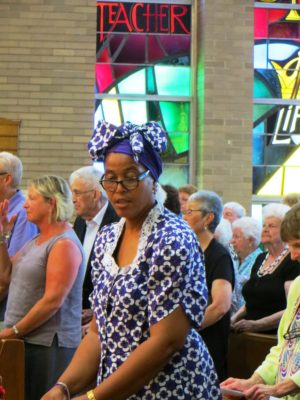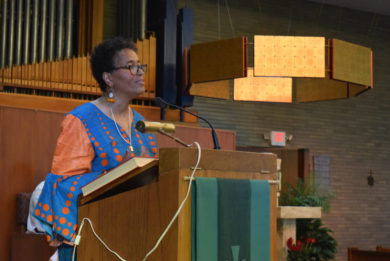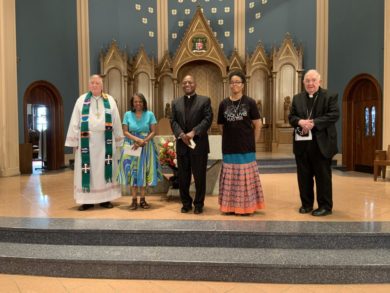June 17, 2020
TRANSCRIPT: Sister Melinda Pellerin talks to ‘Real to Reel’ about curing ‘virus’ of racism
REGIONAL
Staff report

Sister of St. Joseph Melinda Pellerin, the first African American woman to join the Sisters of St. Joseph of Springfield, is pictured during the Aug. 9, 2015 liturgy at Holy Name Church in Springfield in which she professed her first vows. (iObserve file photo/Rebecca Drake)
SPRINGFIELD — On the June 13 edition of “Real to Reel,” Sister of St. Joseph Melinda Pellerin spoke to program host Sharon Roulier about the need for Catholics to fight for racial justice. Following is the transcript of the interview, which can be viewed at https://www.youtube.com/watch?v=lVcDBBSDcME.
Sharon: Pope Francis called on us globally to stand up to racial injustice. What does the church need to do to put an end to this?
Sister Melinda: Sharon, in part of that statement he also said we can’t turn a blind eye to racism and I think globally we’re seeing, we’re bearing witness to a global community that is reacting to the death of an African American and they’re really making a stand for social justice and I think that that’s what we need to do. Unfortunately, I don’t see that very much in the American church, in America among the bishops. Very few bishops have come out in talking about the death of George Floyd. Nationally, I see a resurgence of people that are protesting, but in this local community of Catholics I don’t see very many Catholics who are standing in outrage to what has happened, and I think, following the pope, we need to do more of that. Silence is not golden, it’s deadly.
Sharon: So what can we do?
Sister Melinda: Well, one of the things we can do in local churches, in our parishes, we can have prayer groups. Prayer is really important; the pope talked about prayer. In fact, he mentioned that praying to Our Lady of Guadalupe, the Blessed Mother. Our Lady of Guadalupe is the Blessed Mother of the Americas. That’s one step. Another step, I think, that all the parishes should be doing is our priests are the leaders of the parishes. Why isn’t it that on the pulpit priests are talking about this issue? I think programs like JustFaith are really good opportunities for people to learn about white privilege and how white privilege has caused many of the problems that we have in this nation. But I think you gotta move from programs like JustFaith to protesting and really doing what Jesus asked us to do. Jesus turned all the tables over in the temple and that’s a reaction and it causes consequences. Catholics have to know that, if you take stands like this, you are in step with what Jesus teaches us: to love our neighbor and when our neighbor is asking for our help we must do that, we must help.
Sharon: Commitment to the dear neighbor is the mission of the Sisters of St. Joseph of Springfield, a mission that Sister Melinda was drawn toward. She made her final vows — the first African American to join the Sisters of St. Joseph of Springfield — last October 13 during a liturgy at Holy Name Church in Springfield, the city of her birth.
You tell me you were born and raised in Springfield. What was that like for you as a young, little black girl growing up in Springfield?

Sister Melinda Pellerin speaks at Holy Name Church in Springfield, where she professed her final vows on Oct. 13, 2019. (iObserve photo/courtesy of Sisters of St. Joseph)
Sister Melinda: As an African American it was really difficult, because on the street we lived on, Sycamore Street, most of the children and most of the families went to black Baptist churches and here’s this one Pellerin family who every Sunday trotted off to Holy Family Catholic Church. So among other African American children, “Oh, you’re going to that white church.” And so I grew up in that, I grew up in a black neighborhood but I went to a white Catholic church and school. So, it was very different from where my classmates came from and racism existed there.
I can remember, at age 6, a little boy in Sister Richard Agnes’s class looked at me and said, “Why are you so dirty?” I was the only black student in the class and I remember literally going down to the bathroom and using soap and trying to wipe this off, and when I got home and explained it to my parents, and so that was one of the first talks that we had about the differences between me and the other children in class. Then, my 6-year-old self, I wondered why did this little boy think I was dirty? So, those were some of my first experiences with the difference between who I was and the other students in the class.
Sharon: And your parents grew up in Louisiana and they wanted you, well, they didn’t have children when they moved up here from what you were telling me, but they didn’t want their children to have to experience that. But what were some of the things that they experienced growing up in Louisiana and why did they move?
Sister Melinda: They grew up in Broussard, Louisiana. In fact, my parents grew up a house away from each other. My father was the only boy and he had four sisters. My mother was the youngest and the only girl and she had four brothers. They grew up in the system of segregation. So they knew what it was like. We constantly, my family, my cousins, my sisters and brothers and I, heard stories about going to the white Catholic church in Broussard, Louisiana: The congregation, white congregation would sit up front, black congregation sat in the back. White Catholics got their Communion first. Black Catholics got (Communion) after all the white Catholics got Communion. The white priest would put gloves on and give Communion to them, black Catholics. So my father always said, “I don’t want my children — if I marry this woman and we have children — I don’t want them raised in the segregation of the south.” And so my mother had been to Springfield a year prior to their marriage and they decided to move to the state where the Kennedys had lived. My father always said that he wanted a chance for his children to have a better education.
Sharon: So, this week we are having a prayer service for unity. What are your thoughts on that?

Participants in the Prayer Service for Racial Unity were Archbishop Mitchell Rozanski; Marion Johnson; Father Warren Savage; Sister of St. Joseph Melinda Pellerin; and Springfield Bishop Emeritus Timothy McDonnell. (iObserve photo/Sharon Roulier)
Sister Melinda: So I love the first song that we’re doing for the prayer service, “A Balm in Gilead.” The word “balm” is an ointment and you spread an ointment to comfort. So this song is actually a spiritual that black slaves sang on the plantations. If you can imagine, these slaves’ lives were horrific but they still held on to hope and that God would sooth all of their problems and all of the things that they were experiencing in slavery. So the song gives hope.
Sharon: There is always hope, says Sister Melinda. During the Friday 5 p.m. prayer service for unity, participants prayed for racial harmony and the need to put a balm on the sin of racism that the United States has dealt with for 400 years. The planned prayer service is one of many events throughout the state and the nation that have followed the May 25th death of George Floyd, a black man killed by a Minneapolis police officer who knelt on Floyd’s neck for nearly nine minutes. Following Floyd’s death, apostolic administrator – Archbishop-designate Mitchell Rozanski – called for people of faith to “pray for an end to this violence and the beginning of a meaningful effort to address the underlying currents of the racial divide.”
The prayer service was organized by Father Warren Savage, Sister Melinda Pellerin, and Marion Johnson, administrative director of the Springfield Diocese’s Black Catholic Apostolate. Sister Melinda says, just like we are all dealing with COVID-19, so too, is racism a virus.
Sister Melinda: So number one, it’s a pandemic. It’s just as bad and infectious as the pandemic we’re talking about today. I often call it the pandemic of racism that we have never found a cure for; we have never truly dealt with it. So, number one, in order to get rid of a pandemic, you have to deal with it. You have to discuss those really difficult conversations about race and why that this has happened for 400 years and then you have to act. You can’t be about talk. You can’t be about reading a good book on social injustice, racism, you’ve got to act. So you’ve got to be in the streets, you’ve got to peacefully demonstrate for the rights of African Americans and what’s happening today. And when you act, know in the model of Jesus Christ, that this is not going to be easy. Not any of it is easy. Martin Luther King, in his letter in Birmingham Jail, said racism is like a boil and a boil is disgusting. It’s got to be lanced. It’s got to be taken care of. If you don’t, the boil just gets bigger and bigger, and today we’re seeing that happening. We’ve never dealt with it. And so we have to, and just like that the COVID virus, we have to be dedicated to finding a cure for it.
Sharon: Well, let’s hope for that cure that it comes very, very soon. And we thank you for talking to us and we’re praying for you.
Sister Melinda: Thank you.


 Facebook
Facebook Youtube
Youtube
